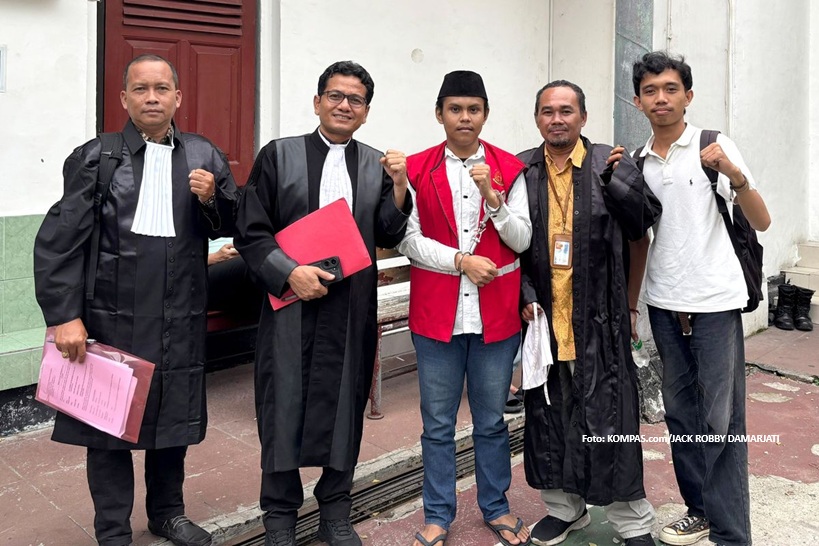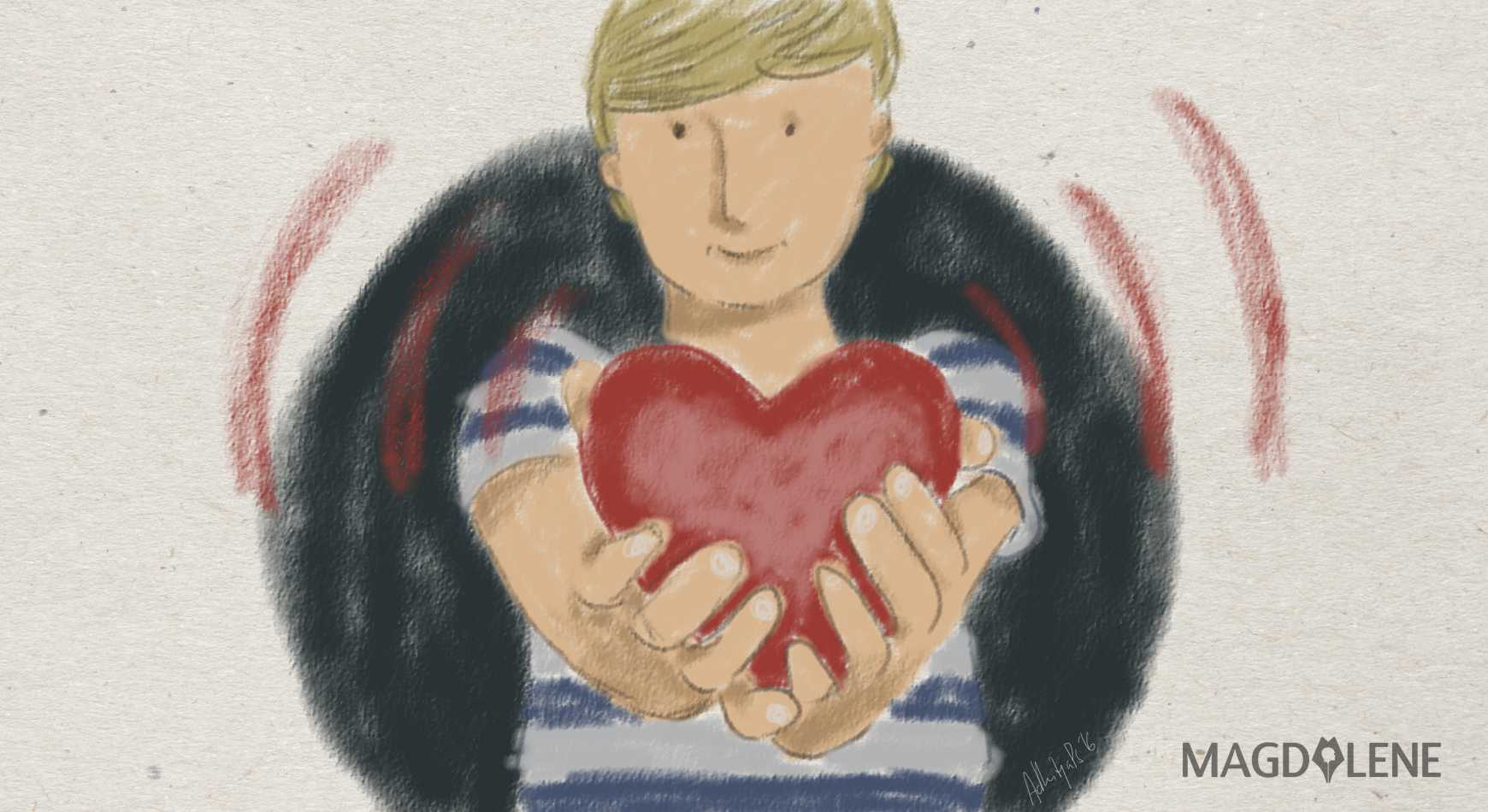Underreported and Un-viral: The Plight of Indonesian Migrant Workers

It was 8.30 in the morning of Nov. 4 at Hong Kong High Court. A couple dozens of visitors, mostly journalists, hurried to enter the courtroom on the 14th floor to get the best seat on the benches before they were full. It was the case that has for some time attracted the attention of local people and international media, the sadistic murder of two Indonesian women, Sumarti Ningsih, 23, and Seneng Mujiasih, 26, by British banker Rurik Jutting, 31.
I looked around and found only two Indonesian journalists, both from Hong Kong-based Indonesian language newspaper Suara. One of them is Dina Damayanti, my close friend whom I came to visit on a short vacation. I had tagged along with her to cover the case out of curiosity because it had been underreported back home. The Indonesian media had been more interested in the alleged murder of a woman named Wayan Mirna Salihin by her friend Jessica Kumala Wongso, the country’s version of Amanda Knox. Virtually every television station in Indonesia closely covers the case, with some broadcasting the court hearings live, which can sometimes last an entire day. Compared to the sadistic double murder perpetrated by Jutting, Jessica’s cyanide in the coffee looked like child play.
At the same time the social media in the “Twitter capital of Jakarta” has not been buzzed with the Hong Kong murder case either.
“I’ve been asked by several foreign journalists, why they had never seen any Indonesian journalist covering the trials except for me and my friend,” Dina said. “I told them that we have a lot of domestic issues back home. And maybe Indonesian news media don’t have lot of budget to cover court cases abroad.”
She added: “I didn’t tell them that (the lack of media attention) may have something to do with the fact that the victims were sex workers.”
The prosecutors and barristers entered the courtroom, took their places and put on wigs and robes – a British tradition that dated back to the 14th century and is still practiced in England and the Commonwealth countries. A moment later, the defendant was brought inside and sat at the secure dock. Wearing light blue long-sleeve shirt and black pants, he was no longer the burly man in the photographs published on the media when he was arrested in 2014. He had slimmed down since then and his hair was now clean-cut, no longer unruly like in those photographs.
At 9 a.m. sharp the juries appeared, followed by the judge a while later. Everybody stood up and bowed to the judge before he opened the hearing briefly and handed the floor to the prosecutor, who immediately began to read the final argument before the juries.
I had followed the case through reports on news wires, but nothing prepared me for the detailed, raw account of the murder, torture and rape of the victims. What the prosecutor read in that court hearing was akin to the most gruesome and gory episode of Criminal Minds or any other television crime series.
Cambridge-educated Jutting allegedly subjected Sumarti to “increasingly cruel acts of violence using his belt, sex toys, a pair of pliers and his fists.” After torturing her for three days in his luxurious apartment, he then cut her throat with a serrated-edged knife, before recording his thoughts about what he had done on his mobile phone.
A few days later, Jutting was said to have approached Seneng and brought her to his apartment, where she saw a gag made from rope and a condom. As Seneng shouted at him, Jutting pulled her to the floor and cut her throat with a knife. Both counts of crimes occurred in late October 2014. On November 1, the Briton called the police who then arrested him.
Jutting pleaded guilty not of murder, but of the lesser charge of manslaughter, owing to “diminished responsibility” caused by personality disorder and impaired judgment related to cocaine and alcohol use at the time of the crimes. The prosecutor, however, read that psychiatrists consulted in the hearings testified that while Jutting has the inclination towards sexual sadism and narcissistic disorder, he had control over his behaviors.
Throughout the hearing, the defendant wore a deadpan expression, paying attention to the reading, and sometimes writing something on the paper in front of him.
.jpeg)
***
Sunday is a day off for most domestic migrant workers in Hong Kong, and they usually came to Victoria Park in Causeway Bay, a heavily built-up area on Hong Kong Island. This time, a few hundreds of Indonesian domestic workers gathered at a plaza in the middle of a shopping complex nearby the Park. They rented the area to celebrate the anniversary of one of their organizations, the League of Indonesian Migrant Workers (LIPMI).
There are about 150,000 Indonesian domestic workers in Hong Kong, the second biggest group after the Philippines, many of whom were women working as domestic helpers. They are well organized and active, forming 70 organizations with each of them hosting about 10 to 300 members.
On stage participants took turn showcasing their talents from singing, dancing, poetry reading and walking in kebaya (traditional Indonesian blouse). Passersby stopped to watch them perform.
Ren Anggun, a domestic worker and an activist, greeted us warmly. She just gave an interview with a New York Times reporter and we chatted briefly about the murder case and how it had been underreported by the media back home.
“They wrote it like this: ‘Oh, so migrant workers in Hong Kong turned into sex workers.’ What kind of angle is that? As migrant workers we feel stressed out and frustrated,” she said before excusing herself when a fellow migrant worker came sobbing and asked for a counseling on her case with her boss.
Sringatin said that few Indonesian media organization sent their reporters to cover the case in Hong Kong, possibly because the issue was deemed uninteresting. Of late, there had been some reports, yet the focus remains on either sensationalistic or the melodramatic aspects of the murder, she said.
“At first, the Indonesian media, unlike the media here, mostly focused on the victims’ profession (as sex workers). After the recent court hearing, they covered the way Jutting murdered the two, now that they realized how ruthless the murders were. Several media also reported about how Seneng and Sumarti were the breadwinners for their families,” Sringatin said.
Last year, migrant workers sent $10.5 billion of their income to Indonesia, up 22 percent from the previous year. The money sent home is usually used to support their families and pay for the education of their children or younger siblings. The two victims were no different. Sumarti was a single mother with one young son and elderly parents, while Seneng paid for her diabetic mother’s medical treatment and her family’s new home.
Like many of their fellow migrant workers, Sumarti and Seneng faced economic hardship as domestic workers, who either owe money to employment agencies or want to earn more money because they were the breadwinners in their families back home. Their situations often lead them to take illegal routes, like selling food, doing extra domestic works or, in the case of Sumarti and Seneng, become sex workers.
“Apart from Sumarti and Seneng, there have been cases of Indonesian and Pakistani migrant workers who were murdered by their boyfriends. Migrant workers are prone to violence because they live in their employers’ houses, with salaries that are never raised. So migrant workers here would do anything to meet the needs of their families,” Sringatin said..jpeg)
“If they send everything they earn, how do they pay for their other needs? They would have to find other ways to earn an income, but in Hong Kong they are not allowed to do anything other than domestic works. Their choice then is either to sell things illegally or find partners who can finance them. These make the migrant workers vulnerable to being taken advantage of by people like human trafficking syndicates or people like Rurik Jutting,” Sringatin said.
This is why whatever their statuses were – whether or not they are engaged in illegal professions – people like Sumarti and Seneng deserve to be protected, she said.
“They were victims of violence, victims of the system, of poverty and so on. Don’t judge them by their works – nobody wants to be a sex worker. They said sex workers are bad, but these were good people. They did good to their families, and maybe it was the last resort,” Sringatin said.
“Sumarti, for example, has learned to be a Disc Jockey in Jakarta. Then she came back to Hong Kong to find a new job, but we know how it is in Hong Kong. Once you’re a migrant worker, you will forever be a migrant worker. It will be hard to switch to other jobs, unless you get married or get a higher education, and I’m not sure whether that is possible.”
***
The plaza had grown more crowded with audience and photographers. The migrant workers applauded their peers particularly the kebaya contest, during which the participants wore the traditional dress, their hair put up in traditional bun as they walk the stage on high heels.
Eni Lestari came a little later in the afternoon, having just returned from a conference in Norway where she spoke about the plight of migrant workers. The chair of the International Migrants Alliance had become a media darling since she was chosen to deliver a speech at the United Nations Summit for Refugees and Migrant on Sept. 19 at the UN headquarters in New York.
It was not the first time for Eni, who still works as domestic worker, to speak at a UN event or discussion, but it was her first time speaking in front of 1,900 people, including presidents and prime ministers of UN member countries, UN officials, academics and religious leaders. She spoke about humanizing migrant domestic workers’ working condition.
Having dealt with both international and Indonesian media, Eni was able to tell the difference between the treatments done by the two when it comes to covering the issue of migrant workers.
“Foreign media usually looks at the background while the Indonesian media tend to seek sensation, which I would rather avoid,” Eni said. “I don’t like it and it’s sexist. The angle is always ‘migrant worker speaking at the UN’ . . . and the Indonesian media would ask, ‘What is your hobby? What do you like? Are you married?’ And so on, and so on,” she said.
“Foreign media mostly asked how I became migrant workers, why I chose to become an activist. So I have the freedom to discuss structural issues. For Indonesian media, that’s not interesting, so I have difficulties talking about those issues.”
.jpeg)
“When it comes to the migrant workers’ murder case, the Indonesian media treat it as just another crime story, not even bothering to dig the historical or structural issues underlying it. What caused the women to overstay? Maybe they were lured by foreigner… Indonesian media contacted us just to ask for an update. They never bothered to come to the court hearing. Foreign media are more comprehensive,” she said.
But since she spoke at the UN and with the murder case, at least there has been more attention towards Indonesian migrant workers, she said.
“At least now they interview migrant workers’ organizations. Before, when the media report on (migrant workers) law revision or other issues, they only interview experts, which is not wrong but does not really do justice to the issue. Migrant workers know the issue well and they can analyze the problems,” said Eni.
She then excused herself and asked me to come to the trial the next day, and the verdict hearing on Nov. 8. But by then I would have already gone home.
***
On Nov. 8, Justice Michael Stuart-Moore rejected Jutting’s plea for manslaughter and found the British banker guilty of the brutal murder of Sumarti Ningsih and Seneng Mujiarsih.
“Let no one be fooled by the defendant’s superficial charm. He has not shown a shred of remorse,” the judge said, as reported by the media.
The judge then said to Jutting: “You get prison for life. That is all. You can go now, thank you.”
The verdict was welcomed by the Indonesian community in Hong Kong, which hopes that it would lead to the improvement of the plight of the migrant workers there.
Read Hera’s piece on the rise and fall of feminist movements in Indonesia and follow @heradiani on Twitter.






















